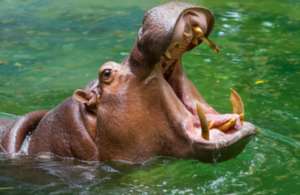Ivory ban could protect hippos, walruses and narwhals
A consultation on extending the scope of the Ivory Bill to protect hippos, walruses and narwhals from the trade in ivory has been announced by the government.

A hippopotamus displays its teeth (Credit: Getty Images)
The government has announced it will consult on extending the scope of the Bill to protect hippos, walruses and narwhals from the vile trade in ivory.
The Ivory Bill currently before Parliament includes a power for Ministers to extend the proposed ban on selling items made from elephant ivory to other ivory-bearing species, which also include sperm whales and killer whales. Ministers have now confirmed that a consultation on extending the ban will be published as soon as possible.
Hippos and walruses are listed as ‘vulnerable’ on the Red List produced by the International Union for Conservation of Nature (IUCN). Concerns have been raised in response to the Government’s consultation about the decline of hippos in particular and the part played by poaching. IUCN population estimates suggest the maximum hippo population has declined by up to 12 per cent between 2008 and 2017.
Environment Secretary Michael Gove said:
Our ivory ban is one of the toughest in the world and will provide vital protection for the African and Asian elephant from the scourge of illegal poaching. But there are many more precious species, like the hippo and walrus, which could fall victim to the callous trade in ivory. The Government will therefore consult on extending the ivory ban to other ivory-bearing animals. We are determined to end this insidious trade and make sure ivory from any animal is never seen as a commodity for financial gain or a status symbol.
The Government has also brought forward an amendment to the bill to ensure that, if necessary, ivory from all animals could be banned and not simply those covered by Convention on International Trade in Endangered Species of Wild Fauna and Flora (CITES). This would allow the ban to be extended to ivory from warthogs or mammoths, for example, if a case for their inclusion was made during consultation.
Defra Minister David Rutley said:
We have today announced that we intend to consult on extending the ban to include other ivory species and will seek to start the consultation process and gather evidence as soon as practicable after Royal Assent. This process will ensure that if we do extend the scope of the ban, this will be robust, defensible, enforceable and compliant with the European Convention on Human Rights. Let me be clear, this will, however, not delay the introduction of the ban on dealings in elephant ivory.
A further government amendment has also been tabled, imposing a size restriction on the items that can quality for the pre-1918 portrait miniatures exemption. Following evidence provided at the Committee stage, the amendment states that the visible surface area of a portrait miniature must be less than 320 square centimetres.
Earlier this week, the three Secretaries of State for Foreign Affairs, the Environment and International Development hosted an event at the Foreign Office, bringing together NGOs, businesses, country representatives and others who are playing a key role in fighting the illegal wildlife trade.
The event recognised the work already being done to tackle the illegal wildlife trade and encourage increased ambition by all sectors in advance of the October conference.